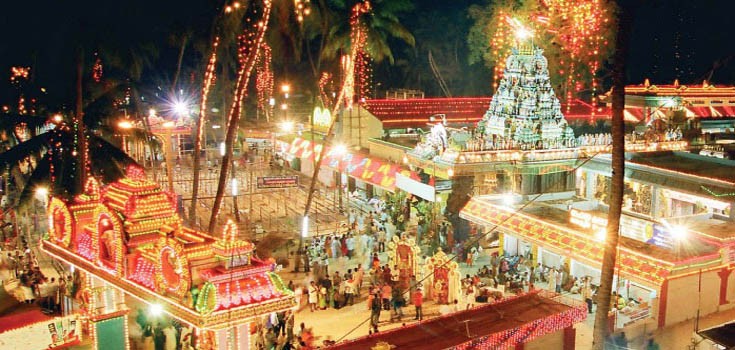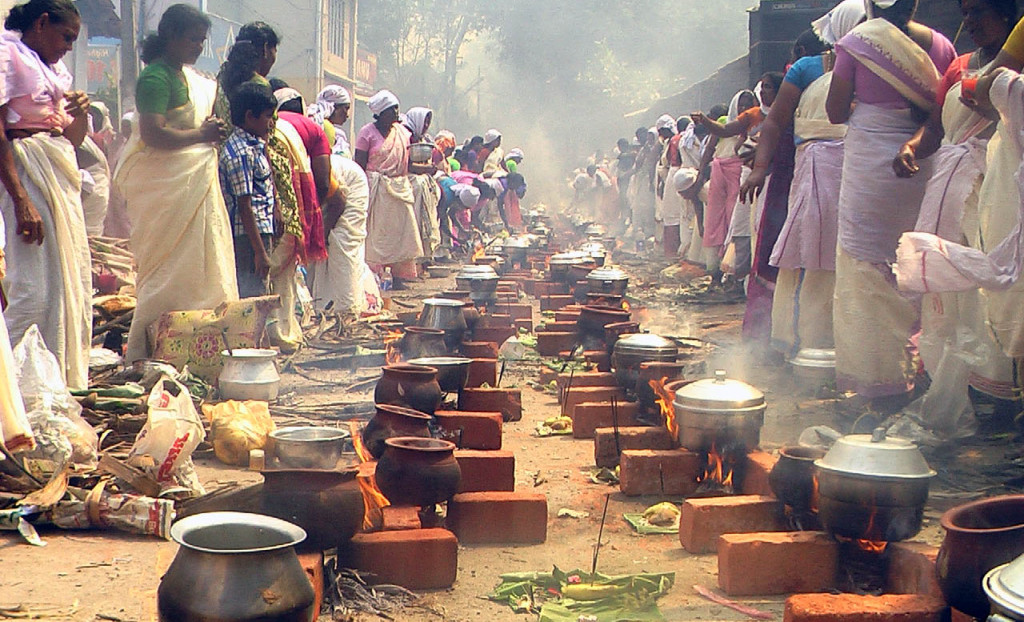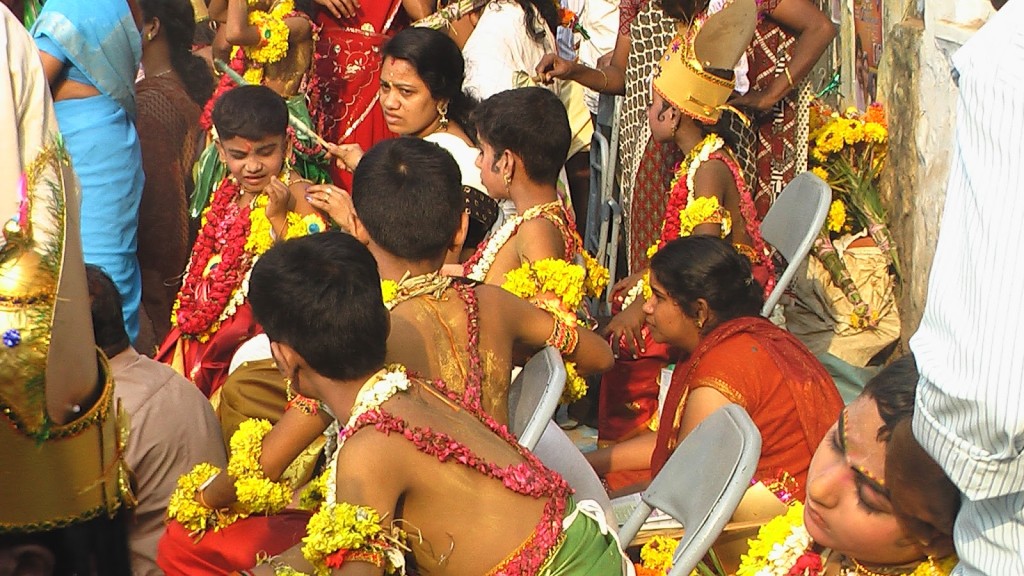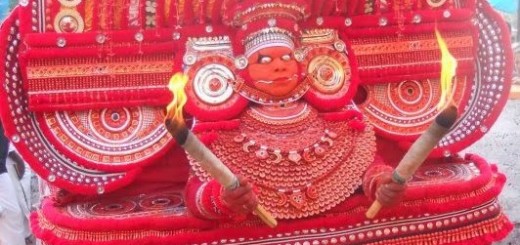Attukal Pongala: An Offering to Appease Mother Nature

Known as the Sabarimala of women, the Attukal Bhagavathy Temple is one of the most famous shrines dedicated to Mother Goddess.
Attukal Pongala is a unique festival. It is a celebration of womanhood and explores our relationship with nature and divinity. Nature bestows upon us its blessings and sustains life on earth. By offering Pongala to the Goddess, we are expressing our gratitude towards the supreme power. When offered with utmost devotion, Pongala leads to spiritual awakening in the devotee.
The Pongala festival recently made it to the Guinness Book of World Records as the largest gathering of women for a religious event. The Attukal Bhagavathy Temple is about 2 kilometers away from the Padmanabhaswamy Temple at Thiruvanthapuram.
This temple is also known as the Sabarimala of Women because most devotees are women. The Goddess worshipped at this temple is the Supreme Mother – the creator of all things living and non-living. She is the preserver and the destroyer of the universe. A visit to the nearby Padmanabhaswamy Temple isn’t considered complete without a visit to the temple of Attukalamma (the Mother Goddess of Attukal).
The Legend of Attukal Bhagavathy
The Attukal Bhagavathy Temple is an ancient one. Some stories have linked the Goddess to Kannaki. Kannaki (also Kannagi) is the central character of the Tamil Epic Chilappathikaram (also Silapathikaram) believed to have been written between 100-300 CE by the Tamil poet and sage Ilanko Adikal.
Kannaki, a pious woman, lived in Madurai with her husband Kovalan. She was a chaste woman devoted to her huband. Kovalan, however, fell in love with a dancer named Madhavi and spent his fortune on her. Within no time he lost all of his wealth. Kovalan realized his mistake and eventually returned to his uncomplaining wife Kannaki. Kovalan tried to recoup his fortune by engaging in trade. To raise initial capital he tried to sell one of the precious anklets of Kannaki. Meanwhile, the king’s soldiers were searching for the stolen anklet of the queen. When a penniless Kovalan tried to sell a precious anklet, he aroused suspicions. The jeweler whom he approached accused him of stealing the anklets of the queen. Kovalan was taken to the king’s court and the king beheaded him without trial. Kannaki became furious when she learned that her husband had been killed. She set out to prove her husband’s innocence. She stormed into the king’s court and broke open the anklet seized from her husband. It contained rubies; the queen’s stolen anklet contained pearls. When the King realized his mistake, he killed himself. He couldn’t come to terms with the fact that he had failed to deliver justice. Kannaki, still furious with anger and sorrow, pulled her left breast out, surveyed the city thrice and flung it on the street. She uttered her curse and the fire in her eyes burnt the city of Madurai. She calmed down at the request of Goddess Meenakshi, the presiding deity of Madurai.
In many parts of South India, Kannaki is worshipped as a Goddess. She is the epitome of chastity and its power. Kannaki is thought to be the incarnation of Goddess Parvathi. After destroying Madurai, Kannaki left the city and reached Kerala. On the way to Kodungallor where she attained Samadhi a few days later, she took a short rest at Attukal. There she met the patriarch of a famous family and requested his help to cross the river. Her beauty and grace convinced the old man that she was no ordinary woman. He happily helped her to cross the river and invited her to his family; however, she disappeared. That night, he again saw her in his dream. She told him that he should build an abode for her in the nearby Kavu (a grove where wild animals and reptiles like snakes are allowed to live undisturbed). As per her wishes, he built a temple in the Kavu. Eventually, this temple came to be known as the Attukal Bhagavathy Temple. Today millions seek the blessings of Attukalamma.
Attukal Pongala

Pots everywhere – on the day of Pongala, the entire area within the 7 km radius of the Attukal Temple will be full of women offering Pongala to the Goddess.
Pongala is the most important festival of this temple. It is held annually on the Pooram Star of the Malayalam month of Kumbam. This year, it will be celebrated on February 23rd.
Attukal Pongala is part of the 10 day annual festival of the Attukal Bhagavathy Temple. The festival starts on 15th February 2016 and concludes on 24th. The Pongala is on the 9th day of the festival (23rd February, 2016).
Visit the temple and participate in the Pongala festival to immerse yourself in the atmosphere of divinity surrounding the temple and its premises. The devotion with which women make the Pongala offering to the Goddess will change your perspective on life, faith and religion.

Attukal Pongala Kuthiyottam – this is a unique ritual performed during the festival. The participants are boys under the age of 13. They are the soldiers of the Goddess. To take part in Kuthiyottam, they have to observe penance for 7 days.
The word Pongala means to boil over. When a pot boils over, it is considered as a sign of prosperity. The ceremony consists of the ritualistic offering of a sweet dish made of rice, coconut, nuts, raisins and molasses. Pongala is offered to earn the blessings of Attukalamma.
Only women are allowed to offer Pongala. Irrespective of caste, creed and religion, they will start assembling at the temple and on both sides of the roads leading to it. Devotees from all over the country and abroad participate in this ritual.
The ten day festival starts with Kappukettu (kappu means bangles). The idol of the Goddess is adorned with bangles. Pongala is offered on the 9th day.
Each year, there is a dramatic increase in the number of devotees. In 2013, 3.7 million women offered Pongala to the Goddess. The entire area within the 7 kilometer radius of the temple will be occupied by women offering Pongala. The crowd that gathers in Thiruvananthapuram on this auspicious day will remind us of the famous Kumbhamela Festival of North India.


